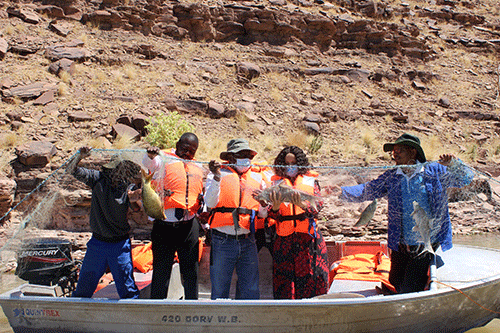Namibia has the potential to make aquaculture one of the industries that contribute to food security, youth employment and community empowerment.
Although the government has put in place several policies to ensure a thriving aquaculture industry and inland fisheries, many Namibians have not taken up this lucrative business venture to make a living.
The fisheries ministry has eight aquaculture projects countrywide, aimed at promoting fish farming throughout the country, and providing extension training services to aspiring fish farmers as well as producing of fingerlings.
University of Namibia (Unam) senior aquaculture lecturer, Ndakalimwe Naftal Gabriel said, regardless of plentiful resources, the aquaculture sector’s contribution to Namibia remains small.
“This could be ascribed to a lack of aquaculture investment, the cultivation of fish with low performance or bad fingerlings quality, a shortage of critical aquaculture inputs and a lack of sector morale or support,” he observed.
Gabriel expressed concern that even in locations with abundant water, such as the Kavango, Zambezi, Kunene, Hardap, and //Kharas, such opportunities have not yet created an environment for the average Namibian to venture into aquaculture for livelihood or business.
Equally, he said the sector has enormous potential to empower communities to produce their own food, establish aquaculture enterprises, generate income, supplement or complement artisanal fishery to meet local fish demand.
Fisheries spokesperson Uaripi Katjiukua acknowledged aquaculture is still at the infancy stage in Namibia, averaging production around 400 tonnes per annum and employment of about 450 people.
“We are considering policy incentives that leverage and attract broader private and social participation, particularly through streamlining policy and regulatory requirements and creating synergies between line ministries where jurisdictions and mandates are overlapping for example land, agriculture and water,” she said.
Katjiukua said the country has also made good advances in mariculture development, with the production of oysters and abalone.
According to her, Namibian oysters and abalone continue to maintain a high reputation as it is farmed in the pure and unpolluted natural seawater from the nutrient rich Benguela current.
For fresh water aquaculture, Namibia produces three-spot Tilapia and African sharp-tooth Catfish for local markets.
“Investors should be encouraged and embraced especially in the area of fish feeds, and other implements such as aquaculture systems,” said Gabriel.
– anakale@nepc.com.na


